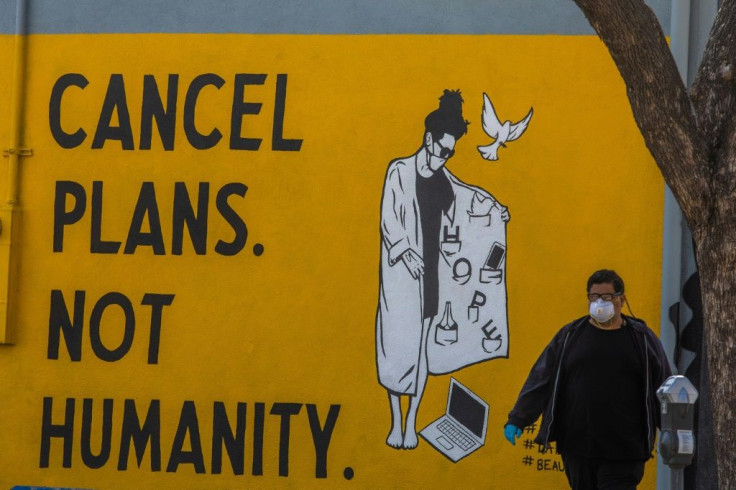Coronavirus US Death Toll Hits 16,545; San Diego Creates 'Powder Keg' For COVID-19

KEY POINTS
- By the end of Thursday, it's estimated the world will have 1.6 million COVID-19 cases and 100,000 deaths
- The U.S. will become the world leader in COVID-19 deaths, probably by Easter Sunday
- Trump originally wanted to re-open the U.S. for business on Easter Sunday by relaxing the strict social distancing guidelines
The world will see its 100,000th death from COVID-19 sometime late Thursday evening, an incredible death toll considering the first known fatality from this disease was confirmed exactly three months ago in Wuhan, China on January 11. There will likely be more than 1.6 million confirmed cases of this disease on Thursday. The first case of COVID-19 was confirmed in Hubei province in China in December 2019.
According to data from Worldometer, there were 1,599,423 COVID-19 cases worldwide as of 23:00 GMT Thursday, as well as 95,523 deaths. World deaths will exceed 100,000 by Friday given deaths rose by more than 7,000 from Wednesday to Thursday.
Of this casualty count, the U.S. has 465,586 cases and 16,545 deaths. It reported an increase of 1,756 deaths on Thursday from Wednesday. The U.S. remains the most heavily hit coronavirus country, as well as having the world's second largest number of deaths after Italy (18,279).
The U.S. will become the world leader in COVID-19 deaths probably by Easter Sunday (April 12), which is the day president Donald Trump initially said he wanted to re-open the U.S. for business by relaxing statewide social distancing guidelines.
Easter Sunday is also day when the U.S. is expected to suffer its largest daily death toll, according to the revised statistical model from the Institute for Health Metrics and Evaluation (IHME) at the University of Washington School of Medicine. In its newest assumptions released Wednesday, IHME predicts peak deaths in the U.S. at 2,212 on Easter Sunday.
Despite the overall grim outlook for the U.S., New York State offers a small but shining blaze of hope its horrendous ordeal from COVID-19 might be seeing the beginning of its end.
New York, which remains the epicenter of the U.S.COVID-19 pandemic, had its lowest daily jump in hospitalizations Thursday, said Gov. Andrew Cuomo. Despite this cheerful bit of news, Cuomo warned the state is just on its "first wave." On the other hand, the number of deaths continues to rise.
"You're not out of the woods," said Cuomo said Thursday. "We've done some great things and we've saved lives because we've followed these policies (like staying at home). The moment we stop following these policies," cases will soar and hospitals will be overwhelmed again, he said.

California, which once led the country in the number of COVID-19 cases back in January, is now the fourth most infected state with 19,691 cases as of Tuesday. State health authorities credit strict social distancing measures for dramatically lowering the case rate.
The positive effects of strict social distancing can be seen in California's projected death rate. IHME projects California will see fewer deaths than New York State despite having twice the population (40 million versus 19.5 million). That gives California a much lower death rate relative to its number of residents.
On March 23, San Diego made the huge humanitarian decision to house homeless individuals at the San Diego Convention Center. More than 800 homeless moved-in on April 8 as part of the state government’s effort to prevent the spread of COVID-19. The plan, called "Operation Shelter to Home," is meant to house homeless individuals to prevent them from spreading the novel coronavirus. Up to 1,500 homeless might later make the convention center their home.
Outreach workers in San Diego, however, fear the opposite might occur. They contend Operation Shelter to Home will spread the contagion more rapidly among one of the most vulnerable segments of the state's population.
“Bewildering is just one adjective to use to describe putting a thousand souls in an open congregate shelter like this during a public health crisis,” said Chris Megison, founder of the homeless outreach organization Solutions for Change, to Fox News. “It’s a powder keg in there.”
Megison said organization hopes nobody dies, "but if somebody does die its involuntary manslaughter as far as we’re concerned because this is irresponsible.”
© Copyright IBTimes 2025. All rights reserved.





















